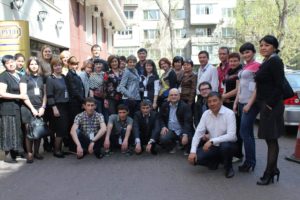 Author: Oksana Maklakova, Russia
Author: Oksana Maklakova, Russia
In early May, Kazakhstan presented and discussed a new concept of providing antiretroviral treatment (ART) to people living with HIV. The concept will be implemented in 2021–2025. Of Kazakhstan’s 19,384 patients registered in HIV care in 2018, 77% are on ART. This quite high indicator gives Kazakh doctors and civil society activists hope that the UN 90/90/90 targets will be achieved in the country.
One-stop shop approach
“Of course, there is a problem with adherence to treatment in Kazakhstan. Treatment regimens change not only because some patients are resistant to certain drugs and need new combinations, but because sometimes there are interruptions in the supply of certain drugs. Optimized treatment regimens and improved quality of treatment as an objective was included in the new strategy by UNICEF and the Kazakh Scientific Centre of Dermatology and Infectious Diseases. NGOs are also working towards achieving this objective. For example, reduction to just eight universal and effective treatment regimens is planned,” says Lyubov Vorontsova, project coordinator of the Central Asian Association of People Living with HIV.
Since 2017, Kazakhstan has been implementing a “test and treat” strategy. In line with WHO guidelines, antiretroviral treatment is prescribed and provided to patients on the same day they are diagnosed with HIV, without waiting for immune status or viral load indicators. Procurement of antiretroviral drugs (ARVs) is regulated and funded by the government. However, access to ART is still a crucial issue in remote areas of Kazakhstan.
“Last year we monitored adherence to treatment in different cities of Kazakhstan. We wanted to find out, firstly, why people are afraid to start therapy, and secondly, why people drop out after they start ART. The first thing we heard is that people are scared of side effects (though in this regard modern drugs are much better than older ones). People also mentioned treatment fatigue, as ART is a life-long therapy. However, there are also remote areas where people have problems with physically accessing the drugs as they live 300 kilometres away from the AIDS centre and do not always have time and money to go and pick up their medications,” says Vorontsova.
Quitting therapy after the baby is born
People living with HIV (PLWH) in Kazakhstan, as in many other countries of eastern Europe and central Asia, are concerned about the quality of ARVs. Kazakhstan is gradually transitioning to modern regimens which are easier to tolerate, have almost no side effects and, most importantly, are more convenient to take. The biggest challenge for both doctors and civil society activists is stigma, self-stigma and discrimination.

“We often hear stories about people who are afraid to take pills at work as someone may see them. There have been cases when colleagues saw a person taking ARVs, then checked the name of the drug on the internet and found out that this person had HIV. As a result, he or she was fired. Of course, such incidents have a negative impact on adherence to treatment,” comments Vorontsova.
There are also problems with the information pregnant women with HIV receive in antenatal clinics. Mothers-to-be agree to start taking ARVs as it is important for their babies. This approach often leads to a situation where the woman stops treatment after delivery. She saves her child, but nobody tells her that first of all she needs the therapy to take care of her own health. To avoid such cases, Kazakhstan would like to introduce peer counselling for pregnant women.
The problem of adherence is crucial in key populations – men who have sex with men, people who use drugs, and sex workers. Due to self-stigma, many do not access health services. It is often much easier for such people to receive support from a civil society organization (CSO) than to go to a government health centre. For this reason, last year many CSOs in Kazakhstan started to actively implement testing and self-testing programmes.
Bargaining for lives
In order to reach as many people living with HIV as possible with quality modern treatment, the Kazakh Ministry of Health decided to procure ARVs through international agencies. It was expected that procuring drugs at minimum prices would allow coverage of patients with new ART regimens to double in the following months, and accelerate transition from older to more modern drugs. However, this spring Almaty residents faced interruptions in the supply of the vital medication dolutegravir.
The Ministry of Health of Kazakhstan and the Pharmacy Committee held negotiations about including Kazakhstan into the voluntary license, which would reduce procurement prices for generic dolutegravir from USD 118 to USD 4.5 This would enable provision of effective therapy to all PLWH in Kazakhstan. However, the patent owner said that only low-income countries can be included in the voluntary license on such terms, and left the old price for Kazakhstan.
“Dolutegravir is really a high-quality medication. It has very few side effects. As there are interruptions in the supply of this drug, patients are transferred to other treatment regimens,” says Vorontsova.
The next delivery of dolutegravir is expected in June. The Ministry of Health will then prepare documents to submit for compulsory licensing, under which generic drugs can be procured at a lower price.



